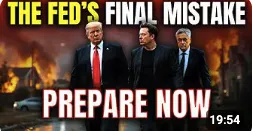
Why the 2025 Housing Market Crisis Could Be Worse Than 2008
Is the Next Housing Crash Already Underway? Here’s Why 2025 Could Be the Final Straw
In 2008, the housing market collapsed almost overnight—taking the global economy with it. Fast forward to 2025, and everyone’s saying, “This time is different.” They’re right. It’s different… and worse.
Here’s why.
The Federal Reserve has never successfully engineered a soft landing when inflation surpassed 5%. Not once in over 100 years. And yet, in 2025, that’s exactly what they’re trying to do—while the cracks are already starting to show.
Inflation, which appeared to be cooling in 2024, is once again rising at its fastest pace in 18 months, especially hitting food and housing. Meanwhile, first-time homebuyers are at a 43-year low, and mortgage rates hover around 7%, crushing affordability and freezing up sales.
But this isn’t your typical housing crash. This is a silent collapse—a slow-motion chain reaction that threatens to freeze credit, choke out demand, and destabilize the financial system from the ground up.
Three Forces Colliding:
1. Inflation and Banking Stress
When the Fed hiked rates rapidly to battle inflation, it wrecked the bond portfolios held by banks. That move sparked the regional bank failures of 2023. Emergency measures patched the problem temporarily, but those same banks are still sitting on billions in unrealized losses. If defaults rise or rates stay high, it could break again.
2. Housing Gridlock
Supply is low. Prices are high. Sales are dead. Most homeowners are locked into low-rate mortgages and won’t sell. First-time buyers can’t afford to buy. It's not a flood of inventory that’s threatening the market—it’s the absence of motion. Combine that with skyrocketing credit card debt, and the strain begins to surface.
3. The Fed’s Impossible Choice
If the economy falters, does the Fed cut rates to avoid recession and risk re-igniting inflation? Or do they keep rates high and crush demand even further? With few tools left, they’re boxed in. Historically, this hasn’t ended well.
Why This Is Worse Than 2008
In 2008, at least the Fed had options—rate cuts, QE, bailouts. In 2025, those same moves come with steep inflationary consequences.
This time, the threat isn't a tidal wave. It’s a slow bleed—frozen sales, rising defaults, and shrinking confidence. Consumer debt is ballooning. Foreclosures may rise, not from bad loans, but from economic strain.
And now, federal spending cuts are on the table. Communities tied to government contracts and jobs could take the first hit, triggering a ripple effect in housing markets nationwide.
How to Prepare Now
Economic chaos creates opportunity—if you know where to look. Here's how to protect (and position) yourself:
Invest in your financial education – Learn creative financing, lead generation, and deal structuring now.
Build income-generating skills – Master sales, negotiation, and marketing to thrive regardless of the market.
Secure credit and leverage – Open credit lines and build lender relationships before banks tighten more.
Solve real problems – Focus on distressed sellers and overlooked deals. Solve their problems, profit from the process.
Surround yourself with action takers – Get in rooms with investors, mentors, and experts who’ve been through market downturns.
Want to Skip the Trial-and-Error?
We're hosting a high-level, invite-only real estate investing intensive in Las Vegas. If you're serious about getting on the offensive, this event includes:
Flight and hotel on us
Access to $150K in funding
Done-for-you LLC setup
3 months of personal mentoring
Only 10 seats available. Apply at Intensive2025.com to see if you qualify.
